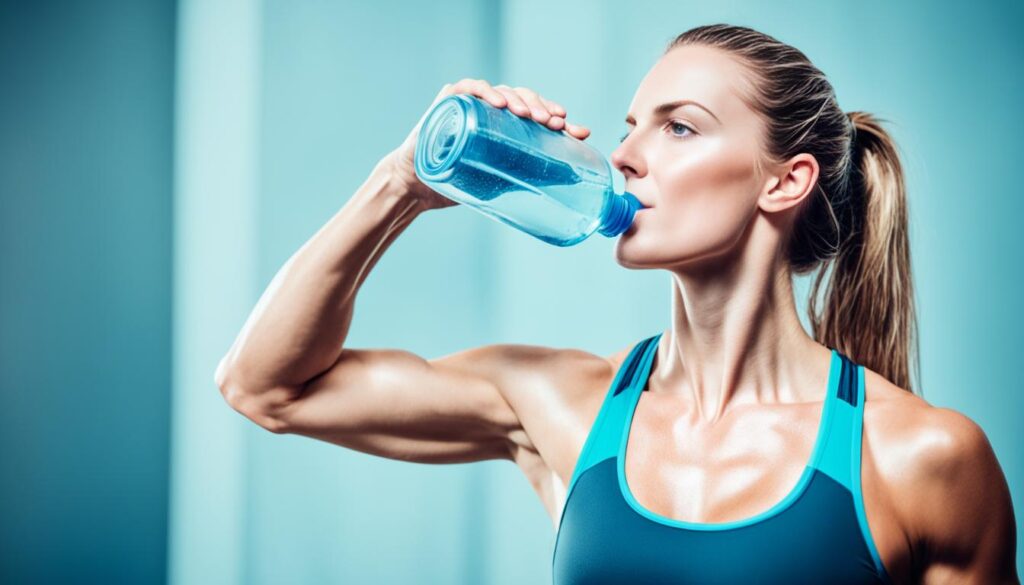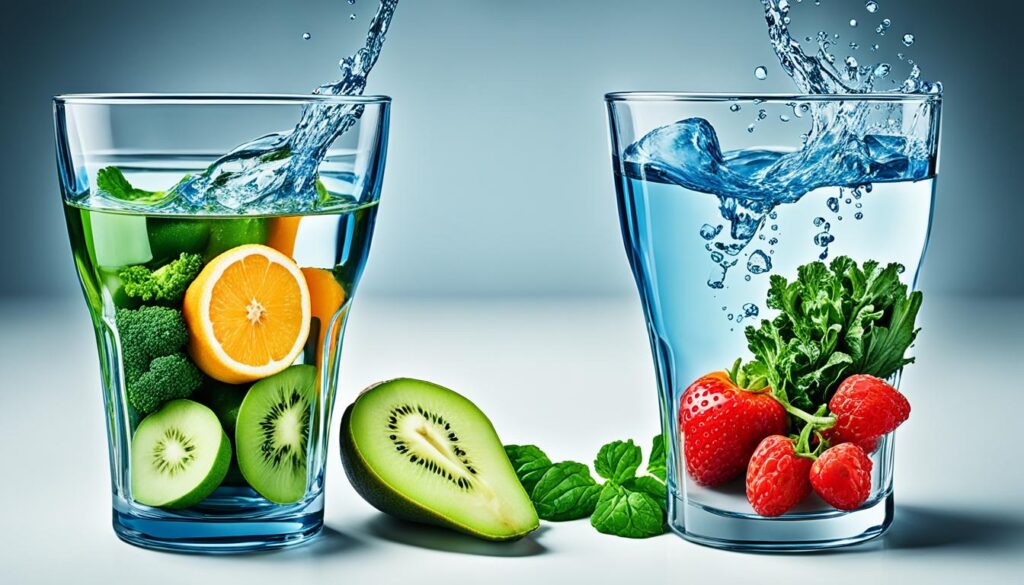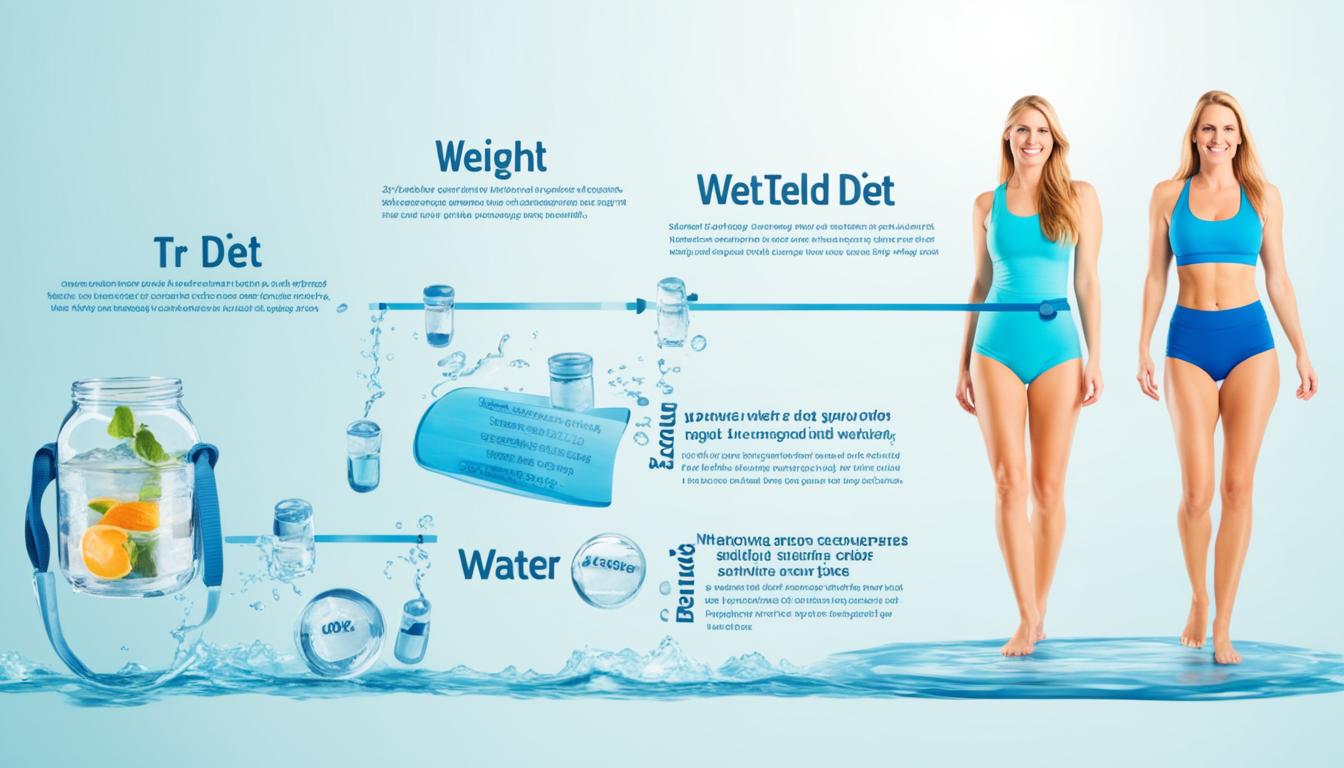Many people are now looking into the link between the water diet and losing weight. Studies show that drinking enough water can help with weight control. Our bodies are made up of about 60% water, which is crucial for many functions like metabolism and controlling hunger.
Drinking water doesn’t cut calories by itself, but it has big benefits. It can help you feel full and boost your metabolism. This makes it a useful part of a weight loss plan.
Drinking enough water can make you feel more satisfied and eat less. Adding water to your diet can help you lose weight. For example, drinking water before meals can lower how many calories you eat.
It’s also key for your metabolism to work well, which can help burn fat more efficiently.
Key Takeaways
- Proper hydration is essential for metabolism and appetite suppression.
- Water intake before meals can help reduce calorie consumption.
- Combining hydration with other weight management strategies yields better results.
- Hydration affects numerous bodily functions, including cognitive performance and fat burning.
- Staying hydrated is beneficial for overall health and effective weight management.
Introduction to Water Diet
The water diet focuses on drinking more water to help with weight management. It suggests that drinking more water can make you feel less hungry, eat fewer calories, and boost your metabolism. This method is part of a healthy lifestyle that includes other good habits for losing weight.
Learning how to do water diet means following a plan for staying hydrated. Here are some important tips:
- People usually drink 2-3 liters of water every day.
- It’s key to drink water and eat a balanced diet together.
- Switching sugary drinks with water can cut down on calories a lot.
- Drinking water before meals can help you eat less, making it easier to eat smaller portions.
- Don’t fast for more than 72 hours without a doctor’s advice to stay safe.
Water diet has more than just weight loss benefits. It helps with digestion, absorbing nutrients, and keeping your blood flowing well. By sticking to the water diet, you can improve your health and feel better overall.
Scientific Evidence on Water Diet and Weight Loss
Recent studies show that a water diet can help with weight loss. Hydration is key for many body functions like digestion and circulation. Drinking more water is a good strategy for losing weight.
Role of Hydration in Bodily Functions
Being hydrated is vital for our health. Our bodies are about 60% water and need enough water to work right. Athletes lose 6-10% of their body weight in water during hard exercise, showing the need to drink more.
Even losing 1-3% of body weight in water can affect mood and focus. Drinking water helps with bowel movements and prevents constipation. It also makes urine more frequent, which lowers the risk of kidney stones.
Drinking water before and after alcohol and before bed can lessen hangover symptoms. It’s also good for the digestive system.
Studies Supporting Water Intake for Weight Loss
A study on water diet found that drinking water before meals helps with weight control. It can make you eat less and boost metabolism.
Drinking water regularly can also improve body mass index and body composition. However, we need more long-term studies to fully understand its effects on weight loss.
| Aspect | Impact |
|---|---|
| Hydration | Improves bodily functions like digestion, circulation, and temperature regulation |
| Water Intake Before Meals | Reduces food intake, aiding in weight management |
| Consistent Water Consumption | Positively correlates with lower body mass index and body composition improvements |
| Additional Water Intake | Increases metabolism slightly and reduces calorie intake |
Combining hydration, exercise, and a balanced diet is key for losing and keeping off weight. As we learn more about the water diet, we’ll find better ways to manage weight.
How Water Suppresses Appetite
Water can help control hunger and aid in weight management. It’s key to know the difference between thirst and hunger. This helps people eat less and stay healthy.
Thirst vs. Hunger
Many mistake thirst for hunger, eating more than needed. The Center for Disease Control says 43% of adults drink less than four cups of water daily. And 7% don’t drink any water. Not drinking enough water makes it hard for the body to tell when it’s hungry or thirsty.
Drinking water often helps tell the difference between hunger and thirst. This can lead to eating less.
Impact of Drinking Water Before Meals
Drinking water before eating can really help control appetite. A study found that drinking two glasses of water before a meal cut calorie intake by 22%. This makes the stomach feel fuller, sending signals to the brain that you’re satisfied.
This can lead to eating less and losing weight. Drinking water before meals is a simple way to manage calories and support weight loss.
Water’s Effect on Metabolism
Drinking water is key to boosting our metabolism. It helps our body warm the water, which increases our metabolic rate. This process is called thermogenesis.
Water makes up about 60% of our bodies, says the U.S. Geological Survey. The National Academy of Sciences suggests men drink 15.5 cups and women 11.5 cups daily for good hydration. This can help keep our metabolism healthy.
Studies show drinking more water can speed up metabolism. For example, a study in ‘The Journal of Clinical Endocrinology and Metabolism’ found drinking 500 ml of water boosted metabolism by 30% in both men and women in just 10 minutes.
Water also helps with metabolism in other ways. Foods with a lot of water make up about 20% of our fluid intake. This helps keep us hydrated and supports metabolic functions.
| Parameter | Pre-Study | Post-Study (p |
|---|---|---|
| Body Weight (kg) | 65.86 | 64.42 |
| BMI (kg/m2) | 26.7002 | 26.1224 |
| Body Composition Score (mm) | 79.626 | 76.578 |
How much water we weigh can change for many reasons like our hydration level, diet, weather, and altitude. A small study showed drinking water before meals can help people eat fewer calories. This can lead to losing weight.
In conclusion, while drinking water may not greatly boost metabolism, it’s still very important for our health. Drinking enough water, as recommended, can have big benefits for our well-being.
Reducing Liquid Calorie Intake with Water
Drinking water daily can help you cut calories. Choosing water over sugary drinks like soda or sweet coffee can greatly reduce your calorie intake. This change offers many health benefits, helping with weight loss and overall well-being.
Replacing Sugary Beverages
Switching to water from sugary drinks has many benefits. Drinking water instead of sugary drinks can save up to 250 calories a day. Studies also show that drinking two glasses of water before meals can lead to eating 22% less food.
This shows how swapping sugary drinks for water can make a big difference. It also helps with hydration, which is good for your skin, blood pressure, and brain.
A study found that overweight and obese women lost more weight by drinking water instead of diet drinks. This shows the benefits of drinking water for both weight loss and staying hydrated. For more tips on starting a water diet, check out this link.
Comparative Studies on Diet Beverages and Water
Studies show that water is better than diet drinks. In an eight-week study, girls who drank water before meals lost weight and improved their BMI and body composition. Another study found that drinking water after meals helped people lose 13.6% more weight than diet drink drinkers.
Over time, studies have shown the benefits of focusing on water in your diet. Replacing one sugary drink or beer with water daily can lead to more weight loss and lower obesity rates over four years. This evidence supports the idea that choosing water over diet drinks is good for your health.
| Beverage | Calories Per Serving | Weight Loss Implications | Other Health Benefits |
|---|---|---|---|
| Water | 0 | Promotes significant weight loss | Improves hydration, supports skin health, brain efficiency |
| Sugary Beverages | 150-250 | Contributes to weight gain | None |
| Diet Drinks | 0-5 | Less effective than water for weight loss | May not support hydration optimally |
The choices we make about hydration can greatly affect our health. Ongoing research continues to highlight the benefits of choosing water over sugary drinks. This makes it a simple yet powerful step towards a healthy weight.
Enhancing Workout Efficiency Through Hydration
Getting the most out of your exercise is more than just about how hard you work out and what you eat. Drinking enough water during workouts is crucial for better performance and avoiding dehydration. Adding electrolytes to your exercise routine helps keep your body running smoothly and supports your muscles. This keeps you going strong and at your best.

Role of Electrolytes
Electrolytes like sodium, potassium, and magnesium are key for muscle movements and nerve signals. When you exercise hard, you lose these minerals through sweat, which can cause muscle cramps and tiredness. Athletes should use drinks with electrolytes to keep their energy up and perform better. A study by Manz and Wentz (2005) shows how important staying hydrated is for keeping your body cool and your blood flowing right during exercise.
Preventing Dehydration During Exercise
It’s vital to avoid dehydration to keep your workouts effective. Not drinking enough water can hurt how well you do physically and mentally. A study by Cheuvront et al. (2005) found that not drinking enough water can make it harder to keep going during exercise in cooler weather. It’s best to drink water before, during, and after working out to refill what you lose.
Drinking water before exercise helps keep your body cool, makes your joints slippery, and gets nutrients to your muscles. This makes you perform better and feel less tired. Having a plan for staying hydrated can also help you see better results from your workouts. For instance, drinking water before meals can make you feel full and eat less, which can help you lose weight, as the National Institutes of Health suggests. Staying hydrated also keeps your mind sharp and motivated, stopping you from getting mentally tired, as Bar-David et al. (2005) found.
Water’s Role in Fat Burning
Water makes up about 60% of our body weight. It’s key for many body functions, like burning fat for energy. This process is called lipolysis.
Studies show drinking water can boost our metabolism. Drinking 500 milliliters of water can increase metabolism by 30% for both men and women. This effect lasts over an hour. This boost helps the body burn fat more efficiently.
Dr. Jessica Sontrop, PhD, has highlighted the protective effect of higher water intake against kidney stones and chronic kidney disease. Consuming sufficient water maintains the body’s balance, promoting better health and facilitating the fat-burning process.
Being well-hydrated helps with nutrient absorption and breaking down food. It makes nutrients work better in the body. Water also helps remove toxins, which can make metabolism and fat burning more efficient.
- Men are recommended to consume approximately 15.5 cups (125 ounces) of water daily.
- Women should aim for around 11.5 cups (91 ounces) per day.
- Around 20% of daily water intake is typically derived from food sources.
Athletes lose 6 to 10 percent of their body weight through sweat during exercise. Staying hydrated can help them burn more fat. It also improves performance and helps with fat burning.
| Water Intake (cups/day) | Effect on Metabolic Rate | Fat Burning Efficiency |
|---|---|---|
| 15.5 (Men) | Increases by 30% | Enhanced |
| 11.5 (Women) | Increases by 30% | Enhanced |
Mental and Emotional Benefits of Staying Hydrated
Drinking enough water is good for more than just your body. It also helps your mind and feelings. Drinking water can make you feel less stressed and help you think more clearly.
Reducing Stress and Increasing Motivation
Drinking water can really help reduce stress. There’s a strong link between water and mental health. Drinking enough water keeps cortisol levels in check, which is the stress hormone.
When you’re hydrated, you feel less stressed. This can make you more motivated to exercise or eat healthy. Dehydration, however, can make you tired, dizzy, and confused. These feelings can make it hard to make decisions or stick to a healthy lifestyle.
Most people need to drink water when they feel thirsty. This usually means drinking about eight glasses a day. But, some people might need more or less.
Improving Mental Clarity and Focus
Keeping your brain hydrated is key for thinking well. The brain is mostly water, so it needs it to work right. Drinking enough water helps your focus and clarity.
Dehydration can make you feel tired, moody, and less sharp. Drinking enough water helps avoid these problems. This makes you think better and work more efficiently. It’s great for your mental health and productivity.
Water Diet vs. Water Fasting
When comparing water diet to fasting, it’s key to know the main differences. A water diet means drinking more water to stay hydrated and help with weight control. Water fasting, however, means not eating or drinking anything but water for a long time.

Water fasting can lead to quick weight loss. For example, a study showed that not eating every other day helped non-obese adults lose about 5.6% of their weight. Another study found a lot of weight loss after 40 days of just drinking water. But, it’s not without its challenges and risks. A study found that older women felt less mentally flexible after a 48-hour fast.
A water diet is a safer and more lasting choice. It helps with hydration without the big risks of fasting. This is an important point when comparing water diet to fasting.
Research on water fasting for weight loss has shown many health benefits. For example, it lowered blood pressure a lot in a study on supervised water fasting. It also helped with kidney function and reduced oxidative stress.
But, it’s important to be careful with water fasting and get a doctor’s advice. It can cause problems like electrolyte imbalances and health risks. A water diet is safer and helps with weight loss and health through better hydration.
“Fasting can induce profound neuronal autophagy and impact bone formation and mineral dissolution,” according to some studies. Therefore, it should only be undertaken with careful monitoring and medical supervision.
Conclusion
Studies show that drinking more water can help with weight loss. People who drank more water lost about 4.4% body fat and 5.4 kg of fat over three months. This is more than those who didn’t drink as much water.
Drinking water before meals also helped with fat loss and improved metabolism. This makes it a good addition to a weight loss plan.
But remember, water alone won’t make you lose weight. It works best with healthy eating and regular exercise. Drinking 500 ml of water can increase calorie burn by 24% for an hour. This should be part of a healthy lifestyle for lasting results.
Long-term fasting showed that most weight loss was lean muscle, not just fat. This means extreme water diets might not be the best long-term solution. The water diet can be helpful, but it should be part of a complete plan that includes good food and exercise. More research is needed to understand its long-term effects on weight management.




